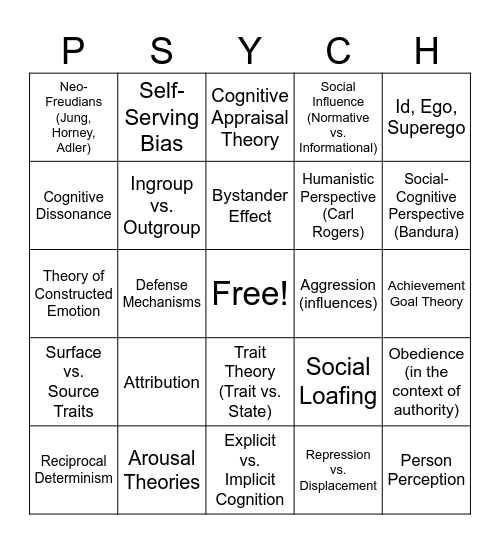

This bingo card has a free space and 47 words: Social Cognition, Person Perception, Social Categorization, Explicit vs. Implicit Cognition, Attribution, Fundamental Attribution Error, Self-Serving Bias, Attitudes (Components), Cognitive Dissonance, Prejudice vs. Stereotype, Ingroup vs. Outgroup, Social Influence (Normative vs. Informational), Obedience (in the context of authority), Social Loafing, Deindividuation, Altruism vs. Prosocial Behavior, Bystander Effect, Aggression (influences), Psychoanalytic Perspective (Freud), Id, Ego, Superego, Defense Mechanisms, Repression vs. Displacement, Neo-Freudians (Jung, Horney, Adler), Humanistic Perspective (Carl Rogers), Actualization Tendency, Social-Cognitive Perspective (Bandura), Reciprocal Determinism, Self-Efficacy vs. Self-Esteem, Trait Theory (Trait vs. State), Surface vs. Source Traits, The Big Five Personality Traits, Incentive Theories, Maslow's Hierarchy of Needs, Self-Determination Theory, Drive Theories, Arousal Theories, Achievement Goal Theory, James-Lange Theory, Cannon-Bard Theory, Two-Factor Theory, Universal Emotions, Cognitive Appraisal Theory, Theory of Constructed Emotion, Emotion Generation Process, Role of Physiology in Emotion, Universality vs. Individual Variation and Flexibility of Emotional Experience.
Perspectives and Personality | Psych 1 Week 9 | Social Psychology | Social Psych Bingo | Social Psychology
Share this URL with your players:
For more control of your online game, create a clone of this card first.
Learn how to conduct a bingo game.
With players vying for a you'll have to call about __ items before someone wins. There's a __% chance that a lucky player would win after calling __ items.
Tip: If you want your game to last longer (on average), add more unique words/images to it.